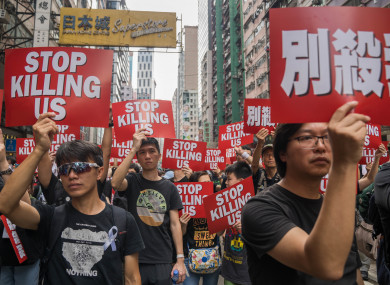Nigerian lawyers oppose US bill against China’s crackdown on Hong Kong protesters
Nigerian lawyers have criticised the U.S. legislation seeking to protect human rights in Hong Kong amidst crackdown on pro-democracy protests in the China-ruled city. The U.S. Senate, in a unanimous vote last week had passed the “Hong Kong Human Rights and Democracy Act”, which would be harmonised with that passed by the House of Representatives […]

FILE PHOTO: Hong Kong protest.
Nigerian lawyers have criticised the U.S. legislation seeking to protect human rights in Hong Kong amidst crackdown on pro-democracy protests in the China-ruled city.
The U.S. Senate, in a unanimous vote last week had passed the “Hong Kong Human Rights and Democracy Act”, which would be harmonised with that passed by the House of Representatives before presenting it to President Donald Trump for assent.
The Senate passed a second bill, also unanimously, that would ban the export of certain crowd-control munitions to Hong Kong police forces. It bans the export of items such as tear gas, pepper spray, rubber bullets and stun guns.
Reacting to the issue, E.M.D. Umukoro Esq said the legislation by U.S. on a domestic affair of China was an infringement of the country’s sovereignty
“Sovereignty is the power or capacity to make laws for the said country to govern herself. No country has the capacity to legislate over the internal affairs of another country,” he said.
Also reacting, Orji Emole Esq said while a nation can make laws against another nation, no nation can make laws for another nation.
He said: “If I’m right that there is a clear distinction between “legislation for” and “legislation against”, then my take will be yes, technically one nation can make legislation against another nation. Conversely, one sovereign nation cannot make legislation for another sovereign nation.”
For Hameed Ajibola Jimoh Esq., “it will depend on the bilateral relationship between the two countries as bilateral relationship permits such as a contract or agreement or understanding. But where there is no such bilateral relationship, the most legally certain is that each country enjoys territorial sovereignty which will prevent one country to legislate a law that aims to bind another sovereign country such as USA and China that you just narrated.”
Also reacting, Obioma Ezenwobodo Esq.said the action of the US lawmakers is beyond their jurisdiction and is therefore “a breach of sovereignty of another nation.”
